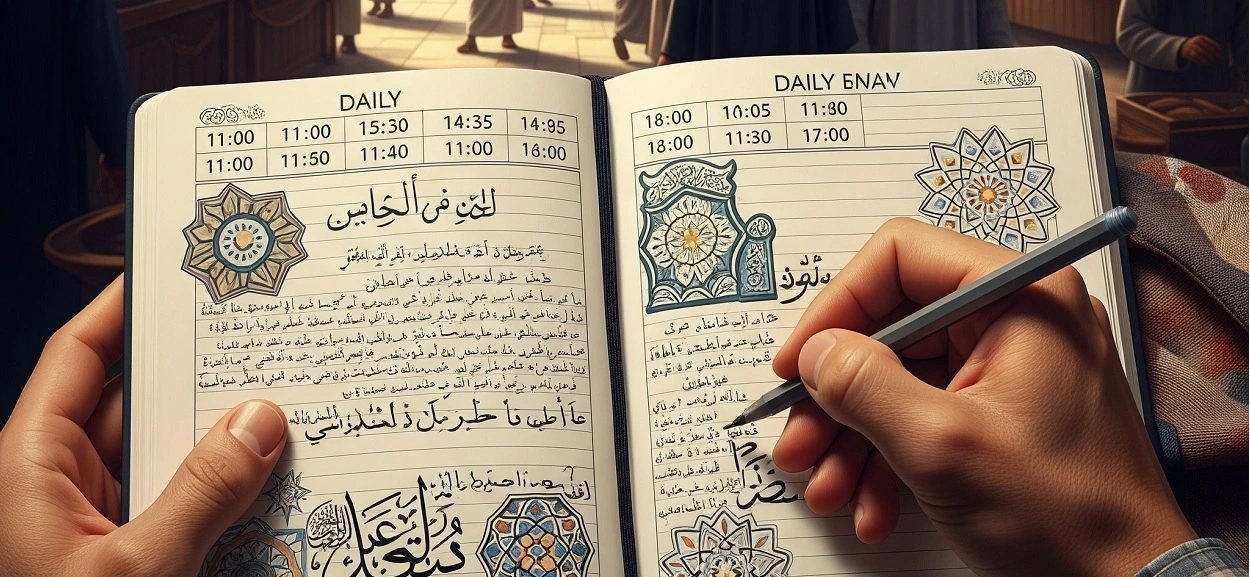Unlock Your Potential! Islamic Self-Improvement: The Path to an Excellent Muslim Persona
Seeking a holistic self-improvement guide? Explore Tazkiyatun Nafs and self-strengthening in Islam: spiritual, intellectual, physical, emotional, social. Achieve success in this life and the Hereafter!

Deep down, each of us longs to be better. Smarter, healthier, more patient, more beneficial. We want to grow, overcome weaknesses, and reach the best version of ourselves. This concept of self-improvement isn’t new; it’s an intrinsic part of the human journey.
But as Muslims, how do we view these Muslim self-development efforts? Is it merely about achieving worldly success? Absolutely not. Islam offers a far more comprehensive framework, connecting every aspect of self-betterment to our ultimate goal: attaining Allah’s pleasure and eternal success in the Hereafter. This is the path to a truly excellent Muslim persona. This article will guide you to understand and implement Islamic self-improvement holistically.
The Concept of Tazkiyatun Nafs (Purification of the Soul): The Core Foundation of Muslim Self-Development
The essence of Islamic self-improvement is Tazkiyatun Nafs, or the purification of the soul. This is a process of cleansing the heart from blameworthy traits (diseases of the heart) like riya’ (showing off), ‘ujb (self-admiration), takabbur (arrogance), envy, anger, stinginess, and replacing them with praiseworthy qualities such as sincerity, humility, gratitude, patience, love, and generosity.
- Allah SWT says: “He has succeeded who purifies it, and he has failed who corrupts it.” (QS. Ash-Shams: 9-10).
This verse affirms that true success lies in the purity of the soul. Without Tazkiyatun Nafs, our self-improvement might only be worldly-oriented and fragile. It is the foundation that will support all other aspects of self-betterment.
The Importance of Knowledge and Noble Character: Two Pillars of Self-Improvement in Islam
In Islam, knowledge and noble character are two inseparable pillars in the journey of Islamic self-strengthening.
- Knowledge: Allah elevates the ranks of those with knowledge. Seeking knowledge is an obligation for every Muslim. Knowledge guides us to know Allah, understand His teachings, and make wise decisions. Beneficial knowledge also brings continuous rewards.
- “Allah will raise those who have believed among you and those who were given knowledge, by degrees…” (QS. Al-Mujadilah: 11).
- Noble Character (Akhlaq): Prophet Muhammad (PBUH) was sent to perfect noble character. Knowledge without character is like a tree without fruit. Noble character is a reflection of strong faith and a barometer of one’s perfect faith.
- “Indeed, I have been sent only to perfect noble character.” (HR. Bukhari).
The self-development of a true Muslim must integrate both: continuous learning and continuous refinement of manners and character.
Aspects of Self-Strengthening in Islam: A Holistic Approach
Islam focuses not only on spirituality but encompasses all dimensions of human life.
1. Spiritual Strengthening: Building Connection with the Creator
This is the heart of Islamic self-improvement.
- Improving Worship: The quality of salat (prayer), fasting, zakat, and hajj. Perform them with humility and deep contemplation.
- Dhikr (Remembrance of Allah): Remembering Allah in every state. Dhikr calms the heart and clears the mind.
- Tilawah of the Quran and Tadabbur (Contemplation): Regularly reciting the Quran and pondering its meanings. This is a source of guidance and a healer for the soul.
- Tafakkur (Reflection): Reflecting on Allah’s creation and His greatness, the signs of His power in the universe.
2. Intellectual Strengthening: Thirst for Knowledge and Critical Thinking
- Passion for Seeking Knowledge: Never stop learning, both religious knowledge and beneficial worldly knowledge. Read books, attend study circles, take online courses.
- Critical Thinking: Don’t easily swallow information. Practice tabayyun (verification), analysis, and use the sound intellect Allah has given you.
- Innovation: The drive to produce new works and solutions that benefit the Ummah, not just imitation.
3. Physical Strengthening: A Healthy Body, a Strong Soul
The body is a trust from Allah. Maintaining it is an act of worship.
- Maintaining Health: Eating halal and tayyib (good and wholesome) food, balanced, and not in excess.
- Exercise: Regularly exercising to keep the body fit and strong for worship and activity.
- Sufficient Rest: Giving the body its right to rest and recover.
4. Emotional Strengthening: Managing the Heart Wisely
- Managing Anger: Learning to control oneself when angry, remembering the Prophet’s saying: “The strong man is not the one who can wrestle, but the one who controls himself when he is angry.” (HR. Bukhari & Muslim).
- Sabr (Patience): Facing trials and difficulties with steadfastness.
- Shukr (Gratitude): Always seeing the positive side and being grateful for Allah’s blessings, even in difficult conditions.
- Empathy: Feeling and understanding others’ emotions, then striving to help.
5. Social Strengthening: Being Beneficial to the Environment
Humans are social beings. Our goodness must radiate outwards.
- Positive Interaction: Speaking good words, smiling, spreading greetings.
- Silaturahmi (Maintaining Kinship Ties): Maintaining and strengthening ties of brotherhood/sisterhood with family, relatives, and friends.
- Being Beneficial to Others: Being naf’un lin nas (beneficial to humanity) through charity, helping those in need, or participating in social activities.
Overcoming Self-Improvement Barriers: Solutions from the Light of Islam
The journey of Muslim self-strengthening is not always smooth. Common obstacles often arise:
- Laziness: Counter it by remembering the Hereafter’s goals and Allah’s promise of reward. Set small, achievable targets.
- Despair: Remember that Allah’s mercy is vast and that Allah does not burden a soul beyond its capacity.
- “And do not despair of the mercy of Allah.” (QS. Yusuf: 87).
- Riya’ (Showing Off) and ‘Ujb (Self-Admiration): Purify your intention solely for Allah. Remember that all goodness comes from Him. Focus on your relationship with Allah, not human praise.
Islam provides profound solutions for each of these obstacles, rooted in strengthening faith and Tawakkul (reliance on Allah).
Self-Improvement Examples from Islamic Figures: Real-Life Inspiration
- Prophet Yusuf (AS): An example of steadfast faith, patience in trials (being slandered, imprisoned), and wisdom in leading a government. He transformed trials into opportunities for self-development.
- Umar ibn al-Khattab: From a harsh man and hater of Islam to a just and firm leader. His transformation is a living proof of the power of guidance and the determination to become better.
- Imam Shafi’i: Persistent in seeking knowledge from a young age, despite living in simplicity. His dedication to knowledge made him one of the foremost Imams of Madhhabs (schools of thought).
They show that self-improvement is a lifelong process, full of struggles, yet yielding extraordinary results.
Practical Tips for Building an Islamic Self-Improvement Routine
Let’s apply this Islamic motivation into tangible steps:
- Set Specific Goals: Instead of “I want to be better,” be specific: “this week I will read 1 Juz’ of the Quran daily,” or “I will wake up 30 minutes earlier for Tahajjud prayer.”
- Create a Daily/Weekly Schedule: Allocate specific time for worship, seeking knowledge, exercise, and social interaction.
- Muhasabah (Daily Self-Assessment): Every night, spend 5-10 minutes reflecting on what was done that day. What good can be improved? What mistakes need to be corrected?
- Find Righteous Friends: Associate with positive people who share a similar vision for self-development. They will remind and motivate each other.
- Increase Du’a (Supplication): Seek Allah’s help and guidance in every effort of self-improvement.
Conclusion: A Never-Ending Journey
Self-improvement and self-strengthening in Islam is a never-ending spiritual and worldly journey. It’s not about instant perfection, but about consistency, sincerity, and determination to constantly move forward towards a better version of oneself in the sight of Allah SWT. With Tazkiyatun Nafs as the foundation, knowledge and character as pillars, and an awareness of all aspects of self-development, we can build an excellent Muslim persona that makes a positive impact in the world and achieves eternal happiness in the Hereafter.
Start today. Every small step is part of a grand journey.
What is one Islamic self-development goal you will set today? Share it in the comments below!
To help you create a more structured plan, download our ‘Muslim Self-Strengthening Plan’ workbook on this website. May Allah bless your every step!





Comments